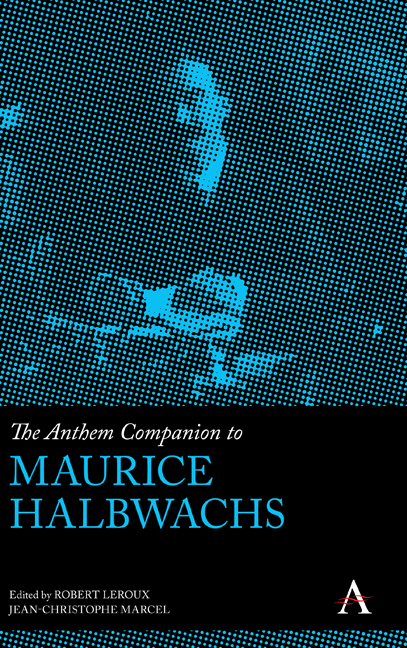Book contents
- Frontmatter
- Contents
- Introduction
- Chapter 1 A Theorist of Collective Memory
- Chapter 2 Halbwachs and the Durkheimian Perspective on History
- Chapter 3 Maurice Halbwachs, Sociologist of Memory: His Reception in Italy and the Development of the Sociology of Memory
- Chapter 4 Population as the Body of Society
- Chapter 5 Urban Morphology and Social Morphology: Marcel Roncayolo and the Work of Maurice Halbwachs
- Chapter 6 Halbwachs’s Leibniz and Halbwachs’s Sociology
- Chapter 7 Halbwachs on Quetelet and the Use of Statistics in Sociology
- Chapter 8 Maurice Halbwachs and the Sociology of Consumption and Social Classes
- Chapter 9 From Criticism of Moral to the Probalistic Test
- Chapter 10 The Age Criterion: Between Sociology and Biology
- Chapter 11 Speculation: Order or Disorder?
- List of Contributors
- Index
Chapter 7 - Halbwachs on Quetelet and the Use of Statistics in Sociology
Published online by Cambridge University Press: 23 February 2022
- Frontmatter
- Contents
- Introduction
- Chapter 1 A Theorist of Collective Memory
- Chapter 2 Halbwachs and the Durkheimian Perspective on History
- Chapter 3 Maurice Halbwachs, Sociologist of Memory: His Reception in Italy and the Development of the Sociology of Memory
- Chapter 4 Population as the Body of Society
- Chapter 5 Urban Morphology and Social Morphology: Marcel Roncayolo and the Work of Maurice Halbwachs
- Chapter 6 Halbwachs’s Leibniz and Halbwachs’s Sociology
- Chapter 7 Halbwachs on Quetelet and the Use of Statistics in Sociology
- Chapter 8 Maurice Halbwachs and the Sociology of Consumption and Social Classes
- Chapter 9 From Criticism of Moral to the Probalistic Test
- Chapter 10 The Age Criterion: Between Sociology and Biology
- Chapter 11 Speculation: Order or Disorder?
- List of Contributors
- Index
Summary
Maurice Halbwachs's career is characterized by a special concern for how statistics can be useful to sociological analyses. He even published a book entirely dedicated to the study of the work of mathematician Adolphe Quetelet and, in particular, of what he called “moral statistics.” The importance of Quetelet's work in the development of early sociology, more specifically through Émile Durkheim and the Durkheimians, who considered it as useful but often incomplete and incorrect, is without any doubt what incited Halbwachs to comment on its scope and limits. It is indeed in continuity to Durkheim's own criticisms of Quetelet that Halbwachs formulated his own. This chapter will present the main elements of Halbwachs's analysis of Quetelet's moral statistics. It will also discuss his subsequent work dealing with statistics, most notably his articles on statistical experimentation and probabilities and on the use of statistics in sociology. As Halbwachs was highly critical of Quetelet's interpretation of statistical means in the social sciences, this chapter will insist on the specific differences in their respective methodological frameworks for the study of the social world. It will also present Halbwachs's concerns about the proper uses of statistics in social analyses.
Since the 1990s, Maurice Halbwachs (1877– 1945) is mostly known as a theoretician of collective memory (Hirsch 2016, 79– 81). Less well known are his contributions on the interpretation of social statistics. This is surprising as he dedicated a great number of books and articles to either applying or theorizing on statistics (Martin 1999, 71). This chapter will thus seek to analyze Halbwachs's extensive criticism of mathematician Adolphe Quetelet (1796– 1874) and, more specifically, of the latter's interpretation of what he called “moral statistics.” It will also show how Halbwachs's idea of the uses and interpretations of statistics was refined over time, as he gained a better understanding of its scope and limits (Alexandre 1949, 5).
Halbwachs's Interest for Social Statistics in Continuity with Durkheim’s
After being influenced by his early teacher, philosopher Henri Bergson (1859– 1941), Halbwachs met Francois Simiand (1873– 1935), who will become a friend and colleague.
- Type
- Chapter
- Information
- The Anthem Companion to Maurice Halbwachs , pp. 109 - 128Publisher: Anthem PressPrint publication year: 2021



